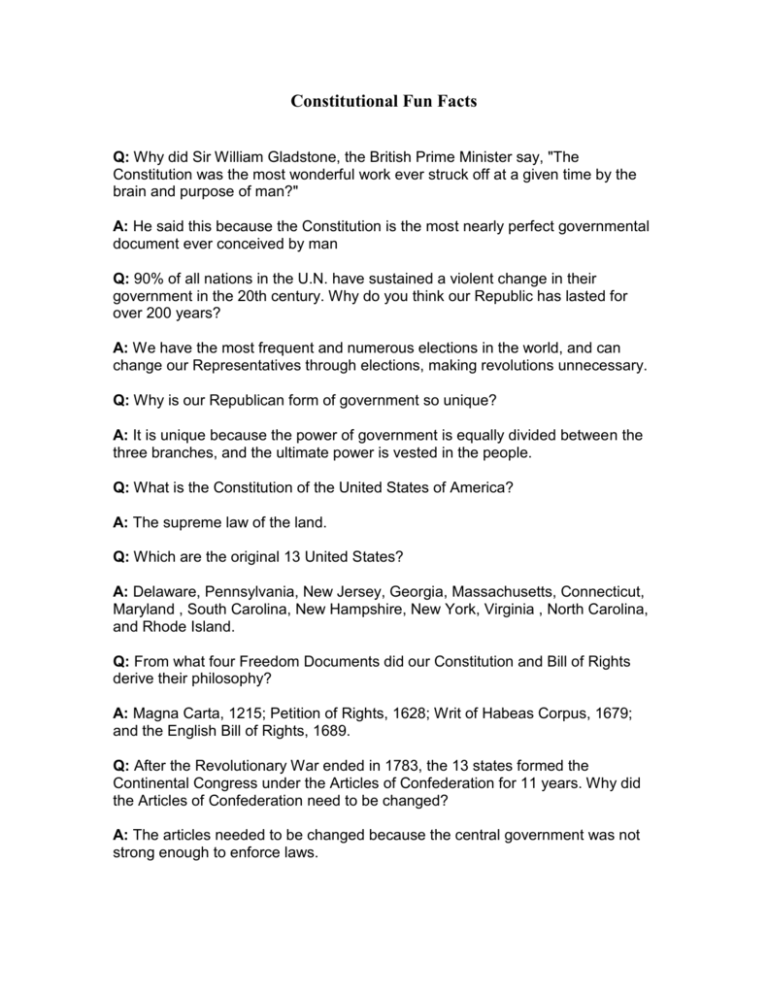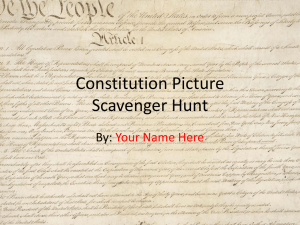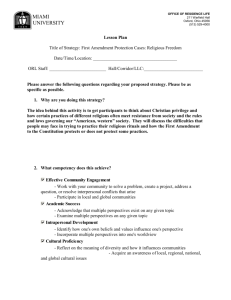Constitutional Fun Facts
advertisement

Constitutional Fun Facts Q: Why did Sir William Gladstone, the British Prime Minister say, "The Constitution was the most wonderful work ever struck off at a given time by the brain and purpose of man?" A: He said this because the Constitution is the most nearly perfect governmental document ever conceived by man Q: 90% of all nations in the U.N. have sustained a violent change in their government in the 20th century. Why do you think our Republic has lasted for over 200 years? A: We have the most frequent and numerous elections in the world, and can change our Representatives through elections, making revolutions unnecessary. Q: Why is our Republican form of government so unique? A: It is unique because the power of government is equally divided between the three branches, and the ultimate power is vested in the people. Q: What is the Constitution of the United States of America? A: The supreme law of the land. Q: Which are the original 13 United States? A: Delaware, Pennsylvania, New Jersey, Georgia, Massachusetts, Connecticut, Maryland , South Carolina, New Hampshire, New York, Virginia , North Carolina, and Rhode Island. Q: From what four Freedom Documents did our Constitution and Bill of Rights derive their philosophy? A: Magna Carta, 1215; Petition of Rights, 1628; Writ of Habeas Corpus, 1679; and the English Bill of Rights, 1689. Q: After the Revolutionary War ended in 1783, the 13 states formed the Continental Congress under the Articles of Confederation for 11 years. Why did the Articles of Confederation need to be changed? A: The articles needed to be changed because the central government was not strong enough to enforce laws. Q: What meetings were called by the states to change the Articles of Confederation? A: The first meeting at Annapolis in 1786 which did not have a quorum; The second was in Philadelphia in 1787. Q: The delegates were instructed to change the Articles of Confederation at Independence Hall, Philadelphia but what happened? A: They wrote a new Constitution instead. Q: Who kept the most complete record of the 1787 Constitutional Convention, and is known the "Father of the Constitution"? A: James Madison. Q: Who was the President of the 1787 Constitutional Convention? A: George Washington. Q: Which state did not send delegates to the Constitutional Convention, and was the last of the 13 states to ratify the Constitution? A: Rhode Island. Q: How many state had to ratify the Constitution before it could be put into effect? A: Nine, about ¾ of the original states (Article 7). Q: Fifty five delegates attended the Constitutional Convention. How many of them actually signed the document? A: Thirty nine. Q: Why did three delegates at the Constitutional Convention refuse to sign the Constitution? A: They refused to sign because they wanted a Bill of Rights included. Q: Name the first state to ratify the Constitution? A: Delaware (December 7, 1787). Q: Which state’s ratification provided the majority required to put the Constitution into effect? A: New Hampshire, the 9th state (June 21, 1788). Q: When did the Constitutional Convention begin in Philadelphia? A: May 25, 1787. Q: Who is credited with writing the Preamble and final draft of the Constitution? A: Gouveneur Morris of Pennsylvania. Q: When was the Constitution signed? A: September 17, 1787. Q: What is the title of the 85 essays written under the name "Publius," in New York, advocating the ratification of the Constitution? A: The Federalist Papers. Q: What three authors contributed to "The Federalist" essays supporting ratification of the Constitution? A: Alexander Hamilton, James Madison, and John Jay. Q: What are the three branches of government? A: Executive, legislative, and judicial. Q: How old must a person be to become president of the United States? A: 35 years old (Article 1, Section 1, Clause 5). Q: On what day does a new President take office? A: January 20th (Amendment 20). Q: How long is the President’s term in office? A: 4 years (Article 1, Section 1, Clause 1). Q: How many days does a president have to either sign or return a bill before it becomes law? A: 10 days (Sundays exempted) (Article 1, Section 7, Clause 2). Q: Which Congressional body has the sole power of impeachment? A: The House of Representatives (Article 1, Section 2, Clause 5). Q: Which Congressional body has the sole power to try impeachments? A: The Senate (Article 1, Section 3, Clause 6). Q: How many amendments are contained in the Bill of Rights? A: Ten. Q: How long a period elapsed between the time Congress introduced the Bill of Rights and the ratification by ¾ of the states? A: Two years and three months (September 25, 1789 to December 15, 1791). Q: Does a member of the House of Representative have to live in the state they represent? A: Yes. Q: Why can members of Congress not be questioned for anything they may say on the floor or in committee? A: To ensure complete freedom. Q: Which amendment protects the right of American citizens to petition the government for redress of grievances? A: The first amendment. Q: Freedom of the press is protected in which amendment? A: The first amendment. Q: What amendment guarantees freedom of speech and peaceable assembly? A: The first amendment. Q: What amendment guarantees freedom of religion? A: The first amendment. Q: Which amendment gives us freedom to bear arms? A: The second amendment. Q: Which amendment prohibits soldiers from moving into a home without consent of owner? A: The third amendment. Q: Which amendment protects Americans from unreasonable search and seizure? A: The fourth amendment. Q: Which amendment protects an individual from being charged twice for the same crime? A: The fifth amendment. Q: Which amendment forbids the government from compelling a person accused of a crime to testify against himself? A: The fifth amendment. Q: Which amendment protects against the government from taking private property for public use without just compensation? A: The fifth amendment. Q: The right to a speedy and public trial, by an impartial jury in the state and district where the crime was alleged, is prescribed in which amendment? A: The sixth amendment. Q: Which amendment prescribes a trial by jury? A: The seventh amendment. Q: Which amendment prohibits imposing excessive fines and inflicting cruel and unusual punishment? A: The eighth amendment. Q: Which amendment states that the rights guaranteed in the Constitution may not be denied? A: The ninth amendment. Q: Which amendment states that all powers not delegated to the Federal Government by the Constitution are reserved for the states or people? A: The tenth amendment. Q: Which amendment says that the citizens of one state may not sue the citizens of another? A: The eleventh amendment. Q: What amendment contains the laws governing the Electoral College? A: The twelfth amendment. Q: Which amendment prohibits slavery? A: The thirteenth amendment, proposed on January 31, 1865, and ratified on December 6, 1865. Q: Equal protection of the laws is protected by which amendment? A: The fourteenth amendment, proposed on June 13, 1866, and ratified on July 9, 1868. Q: Persons who have given, "aid and comfort to the enemy" are prohibited from holding U.S. office under the provisions of which amendment? A: The fourteenth amendment, proposed on June 13, 1866, and ratified on July 9, 1868. Q: Which amendment prohibits the government from denying the right to vote to persons because of their race, color, or previous condition of servitude? A: The fifteenth amendment, proposed February 26, 1869, and ratified on February 3, 1870. Q: Congress is granted power to collect taxes on incomes under the terms of which amendment? A: The sixteenth amendment, proposed on July 2, 1909, and ratified on February 3, 1913. Q: In the original Constitution the U.S. Senators were elected by each state legislature in order to protect state rights in the Congress. How did amendment 17 change this election process? A: The seventeenth amendment mandates U.S. Senators be elected directly by the people of their state. Q: Which amendment prohibits the sale of alcohol? A: The eighteenth amendment. Q: Which amendment gave women the right to vote? A: The nineteenth amendment, proposed on June 4, 1919, and ratified on August 18, 1920. Q: When is the Congress sworn in? A: On January 3 (Amendment 20). Q: Which amendment repealed prohibition? A: The twenty first amendment. Q: Which amendment states that no president shall be elected more than two terms? A: The twenty-second amendment. Q: In what amendment was The District of Columbia granted three electors to the Electoral College, so it could be represented in Presidential elections? A: The twenty-third amendment. Q: What amendment repeals the poll tax or any other tax which denied the right to vote? A: The twenty fourth amendment. Q: Succession of the presidency in case of the death or impairment of the president is decided in which amendment? A: The twenty fifth amendment. Q: Which amendment prescribes that citizens who reach the age of eighteen shall not be denied the right to vote on account of age? A: The twenty sixth amendment, proposed on March 23, 1971, and ratified on July 1, 1971. Q: Which amendment states that compensation for the Congress shall not take effect until after the election of Congress shall have intervened? A: The twenty seventh amendment.









